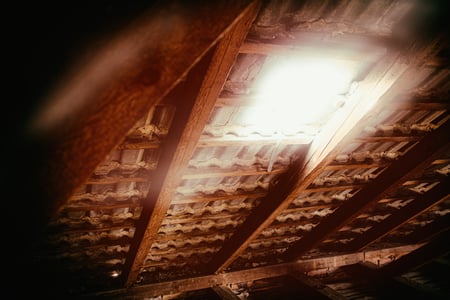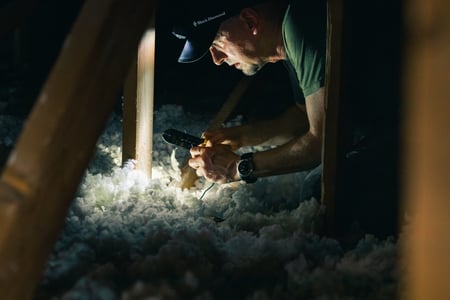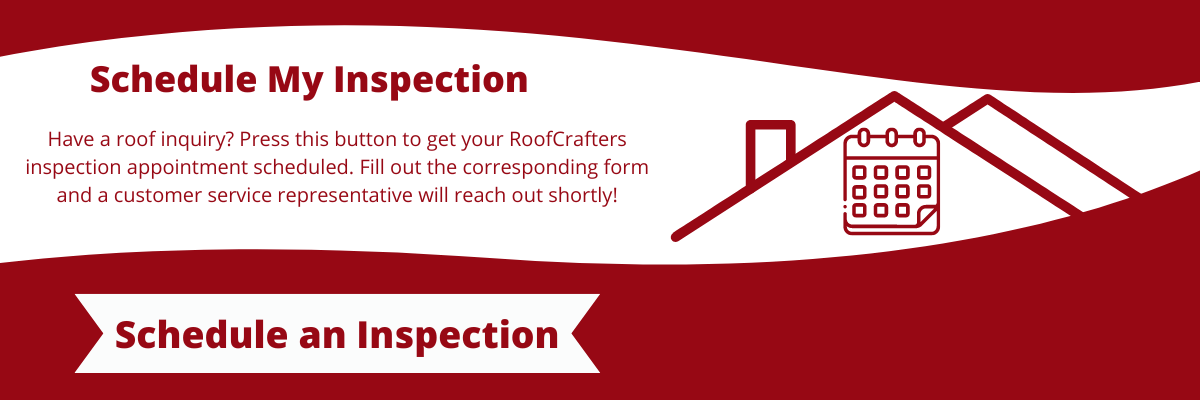All About Residential Roofing Insulation
December , 2023 | 6 min. read

When most people think about the southern states, their minds go to palm trees, white sandy beaches, and most importantly, heat. Natives to Florida, Georgia, and South Carolina, like myself, are accustomed to the rising temperatures. However, despite what most out-of-state folk think, having insulation in our homes is just as important!
Wait, if it’s already hot outside, why do you need insulation? Roofing insulation is mostly known for keeping you Northerners warm on cold winter nights, but we Southerners need it, too! It plays a crucial role in reducing the heating and cooling costs of our homes and helps to limit the thermal transfer between indoor and outdoor temperatures.
Insulation is so important that it’s against building codes in most states to not have it. RoofCrafters has been in the game since ‘94, and we’ve seen what can happen when homeowners don’t follow best practices when it comes to proper roofing insulation. Trust us, it’s not pretty.
So, if you’re interested in preventing long-term roof damage that may result in a premature roof replacement on your home, and learning the ins and outs about this faux cotton candy, come and stay awhile. In just a few short moments, you’ll learn why roofing insulation is important, what options you have for your home, and lastly, your next steps. Let’s get started!
What Is Roofing Insulation and Why Is It Important?

Roofing insulation refers to materials installed in or under the roof structure to reduce the transfer of heat, cold, or sound between the interior and exterior of a home. It's designed to create a thermal barrier that helps regulate temperature, conserve energy, and provide other benefits. Insulation plays a crucial role in maintaining a comfortable indoor environment and reducing energy costs for a few reasons:
.png?width=1200&height=200&name=Recommended%20Reading%20(67).png)
Temperature regulation: Insulation helps regulate indoor temperatures by preventing heat from escaping during cold weather and stopping heat from entering during hot weather. This stabilizes indoor temperatures, reducing the workload on heating and cooling systems.
Energy efficiency: By minimizing heat transfer through the roof, insulation reduces the need for constant heating or cooling. This, in turn, lowers energy consumption and can lead to significant cost savings on utility bills.
Moisture control: Insulation also acts as a barrier against moisture. It helps prevent condensation within the roofing system, which can lead to issues like mold, mildew, and even structural damage if left unchecked.
Soundproofing: Insulation can also contribute to soundproofing by reducing the transmission of outside noise into the home, creating a quieter and more peaceful indoor environment.
Longevity of roofing materials: Proper insulation can extend the lifespan of roofing materials by minimizing temperature-related expansion and contraction, reducing stress on the roof structure.
In essence, roofing insulation is essential not only for energy efficiency but also for maintaining a comfortable, healthy, and durable building environment. The cost of roofing insulation can vary significantly based on several factors, including the type of insulation, the area to be insulated, the insulation's R-value (its effectiveness in resisting heat transfer), and labor costs.
What Insulation Options Do I Have for My Home?

In homes across America, several types of insulation are commonly used for roofing to improve energy efficiency and comfort:
.png?width=1200&height=200&name=Recommended%20Reading%20(68).png)
Fiberglass insulation: Available in batts or rolls, fiberglass insulation is made of tiny glass fibers and is one of the most popular choices for residential roofing. It's relatively affordable, easy to install, and provides good thermal resistance.
Cellulose insulation: Made from recycled paper or cardboard treated with fire-retardant chemicals, cellulose insulation can be blown or sprayed into attic spaces. It's eco-friendly and offers excellent thermal performance.
Spray foam insulation: This insulation type, applied as a liquid that expands into a foam, provides an effective air barrier. It's suitable for various roof types and can be used to seal gaps and cracks efficiently.
Rigid foam insulation: Available in boards or panels, rigid foam insulation (made from materials like polystyrene, polyurethane, or polyisocyanurate) offers high R-values and is suitable for roofs with limited space for insulation.
Mineral wool insulation: Made from natural or synthetic minerals, such as rock or slag, mineral wool insulation is fire-resistant and provides good thermal and sound insulation properties.
Reflective insulation: Reflective insulation, typically made of aluminum foil or other reflective materials, works by reflecting radiant heat. It's often used in conjunction with other insulation types to improve overall efficiency.
Each type of insulation has its pros and cons, and the choice often depends on factors like cost, local climate, available space, installation requirements, and desired R-value. Proper installation by following manufacturer guidelines is crucial to ensure the insulation performs effectively and provides the desired energy-saving benefits.
Is Roofing Insulation a Requirement for My Home?

In most states, insulation is indeed required for roofs. Here are some reasons why:
Energy efficiency: Insulation helps regulate temperature, reducing the amount of energy needed to heat or cool your home. This is important for maintaining a comfortable indoor environment while minimizing energy consumption.
Building codes: Many building codes and regulations mandate minimum insulation requirements for roofs to ensure energy efficiency standards are met. Compliance with these codes is typically required for new construction and renovations.
Comfort and cost savings: Properly insulated roofs contribute to a more comfortable living space by maintaining consistent indoor temperatures. This can result in lower heating and cooling costs over time.
Moisture control: Insulation also helps prevent moisture buildup and condensation within the roofing system, reducing the risk of mold growth and potential structural damage.
However, the specific insulation requirements can vary based on factors such as climate, building design, local building codes, and the type of roofing material used. It's essential to consult with a professional roofing contractor for an inspection to determine the insulation requirements specific to your area and the type of roofing system you have.
Roofing Insulation: Enhancing Comfort and Efficiency
As you now know, roofing insulation is an essential component of any home, serving multiple critical functions. It acts as a barrier against heat transfer, helping to maintain consistent indoor temperatures, reduce energy consumption, and contribute to significant cost savings over time. Additionally, proper roofing insulation enhances comfort by minimizing temperature fluctuations, while also aiding in moisture control and soundproofing.
The choice of roofing insulation should consider factors like climate, building codes, desired R-values, and the specific characteristics of the roofing structure. While various types of insulation exist, each with its advantages and costs, investing in quality insulation and ensuring proper installation are crucial steps toward achieving energy efficiency, structural integrity, and a comfortable living or working environment.
Ultimately, roofing insulation is not merely an expense but an investment that pays dividends through improved energy efficiency, enhanced durability, and a more pleasant indoor space, making it an integral part of any roofing system. If you’re interested in learning more about your insulation options, be sure to hit the “Schedule an Inspection” button down below!
My name is Cassie, and I’m the Content Manager here at RoofCrafters. I was born and raised in Chicago, Illinois, and made my way out to Florida post-college graduation. I’m incredibly passionate about writing and creating valuable content that helps others with the collaboration of my marketing team. When I’m not working, I enjoy shopping (a little too much), spending time at the beach, and reading!



